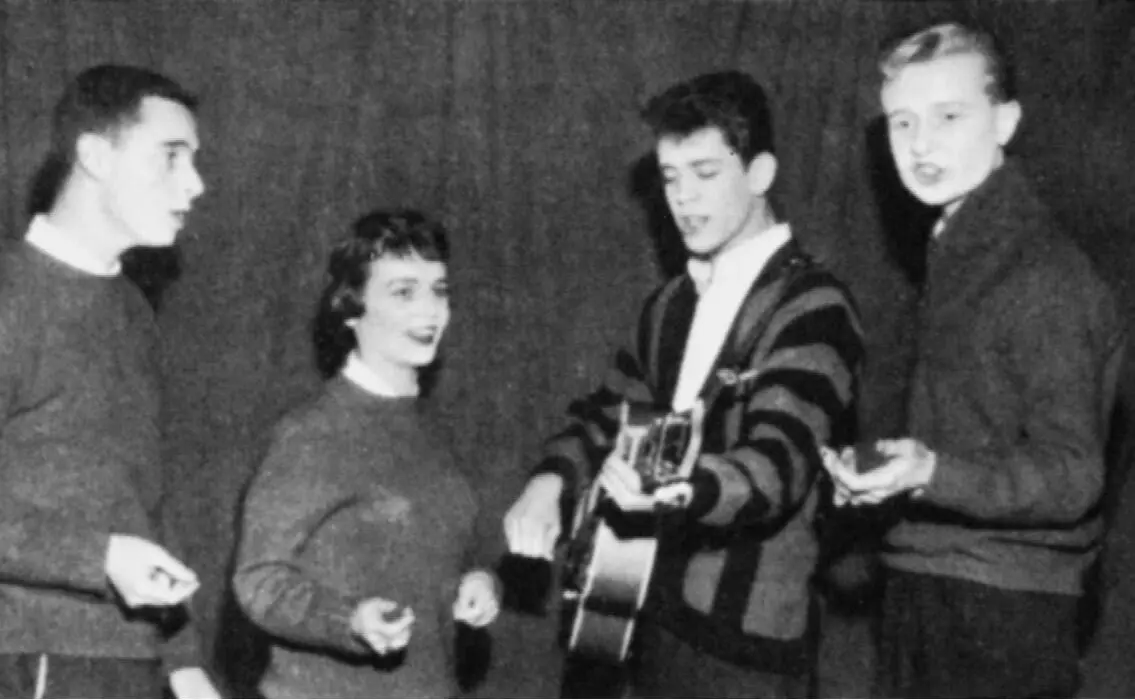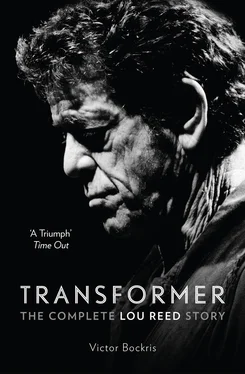“Eddie was friendly with Lou and with me, but Eddie was a lunatic,” agreed Allen Hyman. “He was the first certifiable person I have ever known. He was one of those kids who your mother would never want or allow you to hang out with because he was always getting into trouble. He had a BB gun and he would sit up in his attic and shoot people walking down the street. Lou loved him because he was as outrageous as he was, maybe more. He used to get arrested, he was insane.”
“There was a desire on Lewis’s part—of course I didn’t know this at the time—to be accepted by the regular kinds of guys, and on the other hand he was very attracted to the degenerates,” Andy recalled. “Eddie was kind of a crazy guy who was into petty theft, smoking dope at a very early age, and into all kinds of strange stuff with girls. And Lewis was into all that kind of stuff with Eddie while he was involved with my brother in another scene.” Having managed to convince his parents to buy him a motorcycle, Lou would ride around the streets of Freeport in imitation of Marlon Brando.
Where Lou spent his troubled teen years in Freeport. (Victor Bockris)
According to his own testimony, what made Lewis different from the all-American boys in Freeport was the fact, discovered at the age of thirteen, that he was homosexual. As he explained in a 1979 interview, the recognition of his attraction to his own sex came early, as did attempts at subterfuge: “I resent it. It was a very big drag. From age thirteen on I could have been having a ball and not even thought about this shit. What a waste of time. If the forbidden thing is love, then you spend most of your time playing with hate. Who needs that? I feel I was gypped.”
“There was no indication of homosexuality except in his writing,” said Hyman. “Towards our senior year some of his stories and poems were starting to focus on the gay world. Sort of a fascination with the gay world, there was a lot of that imagery in his poems. And I just thought of it as his bizarre side. I would say to him, ‘What is this about, why are you writing about this?’ He would say, ‘It’s interesting. I find it interesting.’”
“I always thought that the one way kids had of getting back at their parents was to do this gender business,” recalled Lou. “It was only kids trying to be outrageous. That’s a lot of what rock and roll is about to some people: listening to something your parents don’t like, dressing the way your parents won’t like.”
Throughout his adolescence, Lou was saved by his real passion, rock and roll. Lou had fallen for the new R&B sounds in 1954, when he was twelve. Almost instantly, he had started composing songs of his own. Like his fellow teenager Paul Simon, who grew up in nearby Queens, Lou formed a band and put out a single of his own composition at the age of fifteen, appropriately called “So Blue.” To Lou’s parents, these early signposts of a musical career were ominous. Their dreams of having their only son become a doctor or, like his father, an accountant were vanishing in the haze of pounding music and tempestuous moods. Since puberty Lou had honed a sharp edge, wounding his parents with both public and private insults. In his teens, Lou led Mr. and Mrs. Reed to believe he would become both a rock-and-roll musician and a homosexual—the stuff of nightmares for suburban parents of the 1950s. Actively dating girls at the time, and giving his friends every impression of being heterosexual, Lou enjoyed the shock and worry that gripped his parents at the thought of having a homosexual son. “His mother was very upset,” recalled a friend. “She couldn’t understand why he hated them so much, where that anger came from. At first, they had no malice, they tried to understand. But they got fed up with him.”

Reed playing in one of his highschool bands, the C.H.D. or, backwards, Dry Hump Club.
Throughout his teens, Lou would try anything to break the tedium of life in Freeport, especially if it was considered outside conventional norms. Lou found other characters who were also desperate to elude boredom. One such moment came about indirectly through his interest in music. Every evening, the better part of the high-school population of Freeport and its neighboring towns would tune into WGBB radio to hear the latest sounds, make requests, and dedicate songs. Often the volume of telephone calls to the station would be so great that the wires would get crossed, creating a teenage party-line over which friendships developed. On one occasion, Lou became friendly with a caller. “There was this girl who lived in Merrick,” explained Allen Hyman. “She was fairly advanced for her time, and Lou ended up going out on a date with her. He came back from the date, and he called me up and he said, ‘I’ve just had the most amazing experience. I took this girl to the Valley Stream drive-in and she took out a reefer.’ And I said, ‘Is she addicted to marijuana?’ Because in those days we thought if you smoked marijuana, you were an addict. He said, ‘No, it was cool. I smoked this reefer, it was really great.’”
The decades in which Lewis grew up, the fifties and early sixties, were characterized by middle-class unconsciousness and safety. Much like in the TV series Happy Days , most teenagers were more interested in having a good time than experiencing a wider worldview. “There was not a tremendous amount of consciousness about what was happening on the planet,” commented Allen Hyman. “But Lou was always interested in questioning authority, being a little outrageous, and he was certainly a person who would be characterized as mildly eccentric.”
Lou’s eccentric rebellious side found a lot to gripe about within the conservative, white confines of his neighborhood. Hyman remembered that, though outwardly polite, Lou harbored a hatred of his environment that was manifested in an ill will for Allen’s right-wing father. “The reason he disliked my father so much was because he always viewed him as the consummate Republican lawyer. He was very aware early on of political differences in people. We lived in an area that was Republican and conservative, and he always rebelled against that. I couldn’t understand why that upset him so much. But he was always very respectful to my parents.”
Mr. Reed, along with Mr. Hyman, discouraged musical careers for their sons. “He thought there were bad people involved, which there were,” recalled Lou. However, as Richard Aquila wrote in That Old Time Rock and Roll , “adult fear of rock and roll probably says more about the paranoia and insecurity of American society in the 1950s and early 1960s than it does about rock and roll. The same adults who feared foreigners because of the expanding Cold War, and who saw the Rosenbergs and Alger Hiss as evidence of internal subversion, often viewed rock and roll as a foreign music with its own sinister potential for corrupting American society.”
Lewis enjoyed the comforts of his middle-class upbringing, but acted as if he were estranged from the dominant values of suburban American life. Lou would rewrite his childhood repeatedly in an attempt to define himself. Some of his most famous songs, written in reaction to his parents’ values, have a stark, despairing tone that spoke for millions of children who grew up in the stunned and silent fifties of America’s postwar affluence. One friend put her finger on the pulse of the problem when she pointed out that Lou had an extreme case of shpilkes —a Yiddish term that perfectly sums up his contradictory nature: “A person with shpilkes has to scratch not only his own itch, he can’t leave any situation alone or any scab unpicked. If the teenage Lewis had come into your home, you would have said, ‘My God, he’s got shpilkes !’ Because he’s cute and he’s warm and he’s lovable, but get him out of here because he’s knocking the shit out of everything and I don’t dare turn my back on him. He’s causing trouble, he’s aggravating me, he’s a pain in the ass!” According to Lou, he never felt good about his parents. “I went to great lengths to escape the whole thing,” he said when he was forty years old. “I couldn’t relate to it then and I can’t now.” As he saw himself in one of his favorite poems by Delmore Schwartz: “… he sat there / Upon the windowseat in his tenth year / Sad separate and desperate all afternoon, / Alone, with loaded eyes …”
Читать дальше













